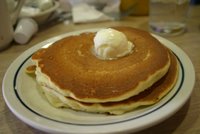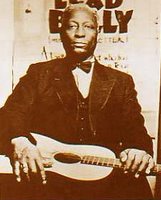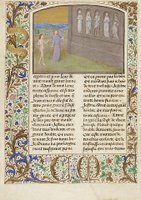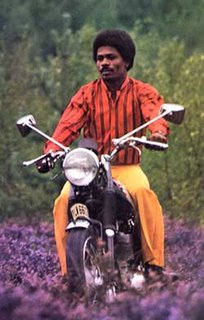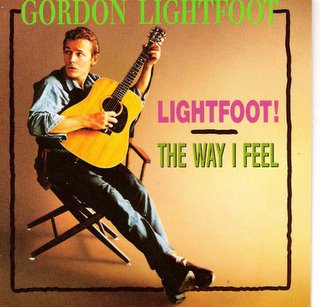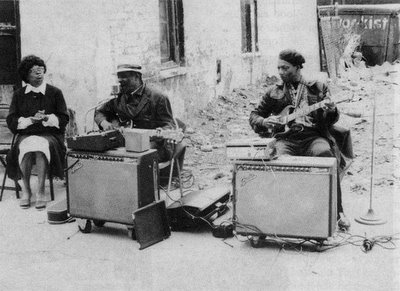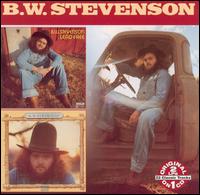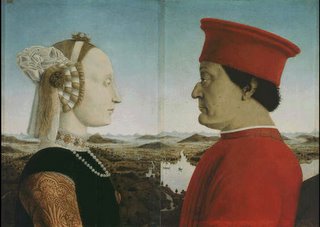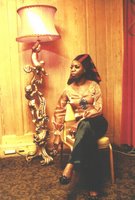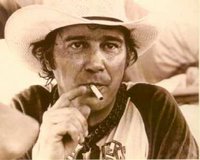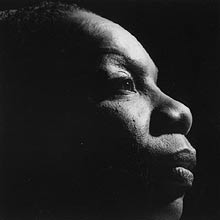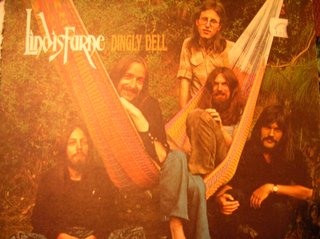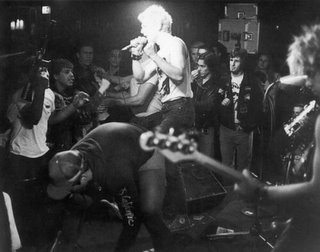
Last week I bought some cowboy boots in Bakersfield, Calif. How could I resist? It would've been wrong to not buy cowboy boots in Bakersfield, Calif. At least that's how you feel when you're riding around those arid oil fields and honky tonk tumbleweed flats, the fading 1950s neon signage for "Wool Growers Restaurant" paling in the dust-covered sun as you listen to Keith Urban on KUZZ 107.9.
Wanna know what's funny? The boots were made in China. They look great and fit like a champ, I must say. God bless the Chinese cobblers, channeling the ghosts of the rig workers, cow punchers, the Brokebackers. They got their ears on the rail ties, listening hard. (Poor bastards probably get a nickel an hour.)
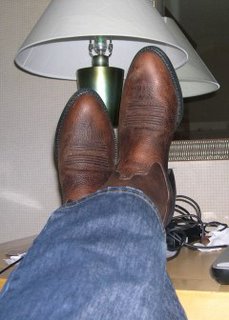
Anyway, I swung by the
Crystal Palace, the club
cum shrine to Buck Owens, owned and operated by Buck Owens and graced with an eight-foot titanium statue of Buck Owens, all located on Buck Owens Boulevard. (Buck also owns KUZZ, fyi.) The top picture, one of Buck's Nudie suits, is there, among the rows of window boxes holding the various historical memoribilia that make Buck Owens Buck Owens. Guitars, an actual Cadillac (a white convertible, interior designed by Nudie, including old Indian coins embedded in the paneling), and just a single window dedicated to
"Hee Haw," the Hillbilly TV that destroyed Buck Owens forever but created "Buck Owens."
But this is all a way of getting to a larger point. I think. One thing leads to another: a thesis, an anti-thesis, a synthesis. iPod teaches us this every day, the serendipitous algorithm that allows Green Day to segue to Tommy James in such a way that only Joan Baez can bring true resolution, emotionally, spiritually, in real-time. I can't explain it, it just is.
Let's give it a try.
Perhaps it starts with the uncarved block, the thing in itself, the Platonic ideal. George Strait singing
"Amarillo by Morning" is almost see-through (hear-through?) in its smooth lack of character, yet it sings through the bones like a white wind at dusk. I love it because it makes me think how transcendent and final it would feel to listen to this on acid while driving a white Cadillac into a West Texas sunset with a great, dear friend who is a Chinese diplomat passed out in the back seat with an empty bottle of Knob Creek cradled in his tiny hands.
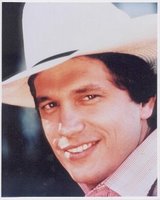
Next, a shadow, a meme, a reflection, the opposite of all that is certain. I found this on another blog and I'm sorry to say i forget which one, but thanks to whoever you are. I dedicate
"Raising the Sparks" to Martin B., who I wish would start posting here. (Get with it, dude.) This is Michael Gira, former Swans CEO, now the main light in the Angels of Light, backed up by the mighty Akron Family. George Strait or Chinese cowboy?

Finally, fission, the unexpected flash of light, a brightness that can't be looked at too directly for fear of blindness -- sunburst enlightenment. It's called Indiana, people. That's where Baby Huey & The Babysitters come from, a place where there are
brothers wearing pointed toed shoes and carrying .45s. The blistering psych-soul vocals and wall of horns rap you upside the head like a set of heavenly brass knuckles. In a world of Chinese cowboy boots, a 400 lb. black man from Indiana is the only solution to the paradox of Michael Gira and George Strait wearing the same hat. Can't you see/hear what I mean?
"A Change Is Gonna Come" ...
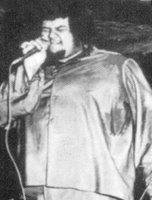
No, of course you can't.
